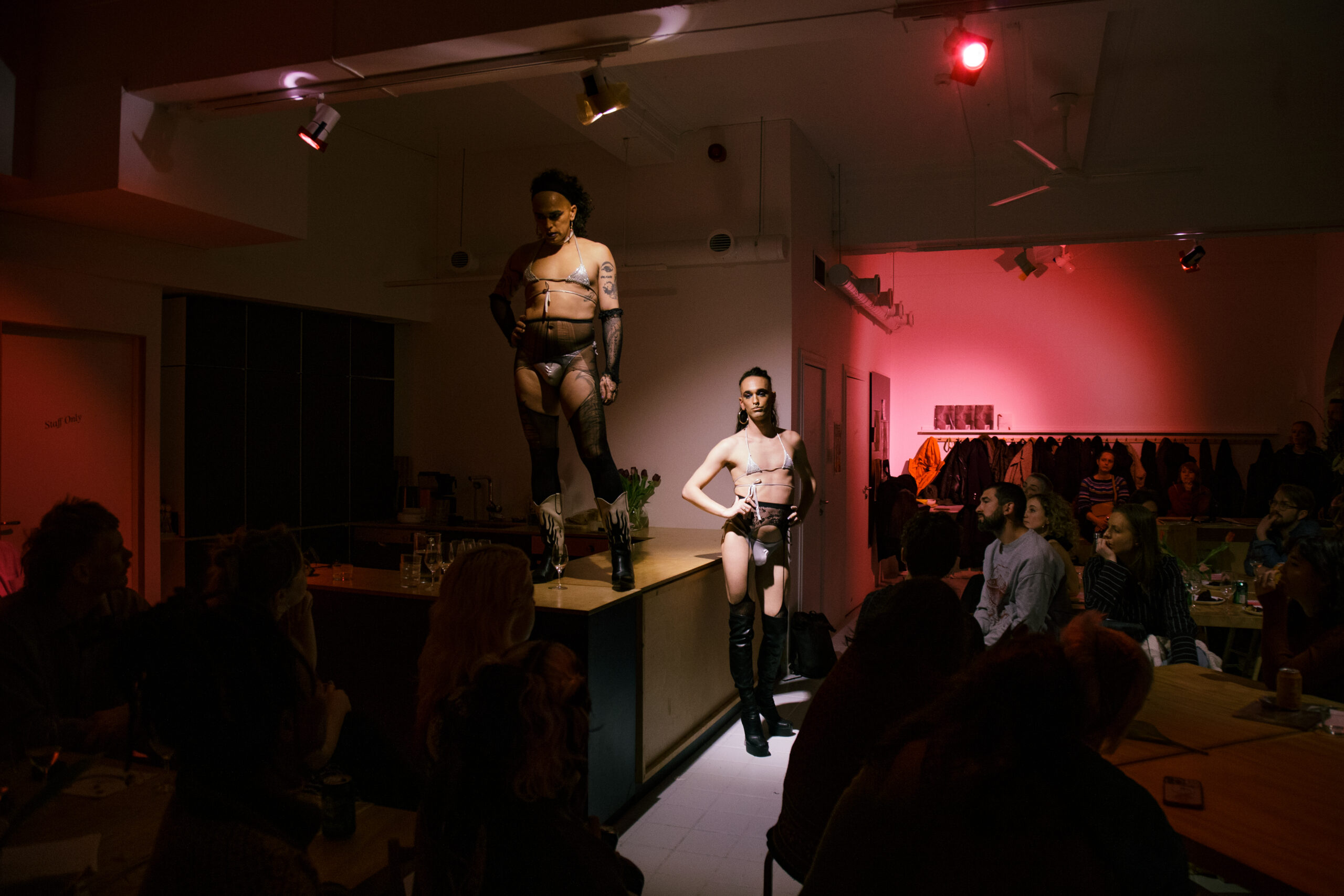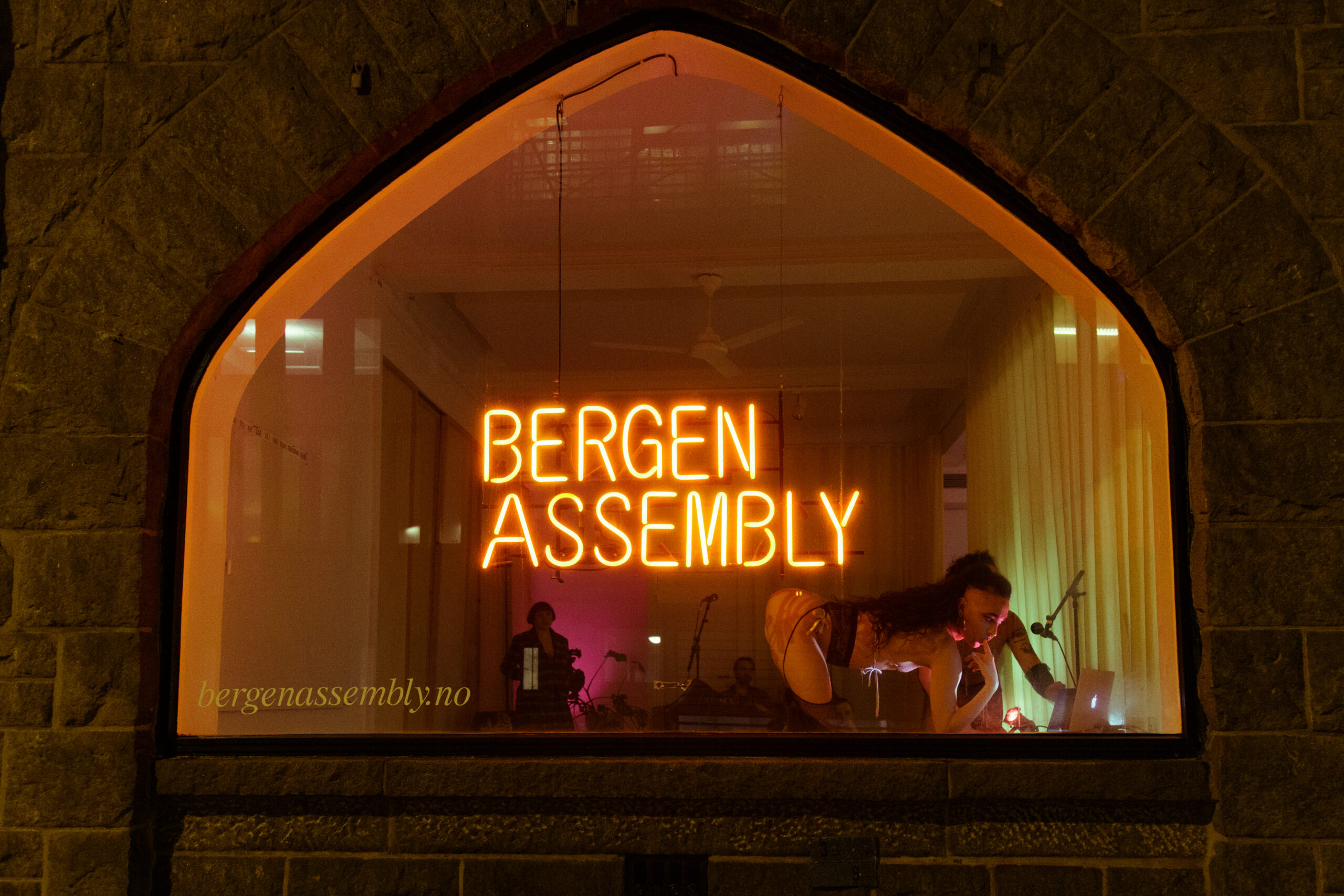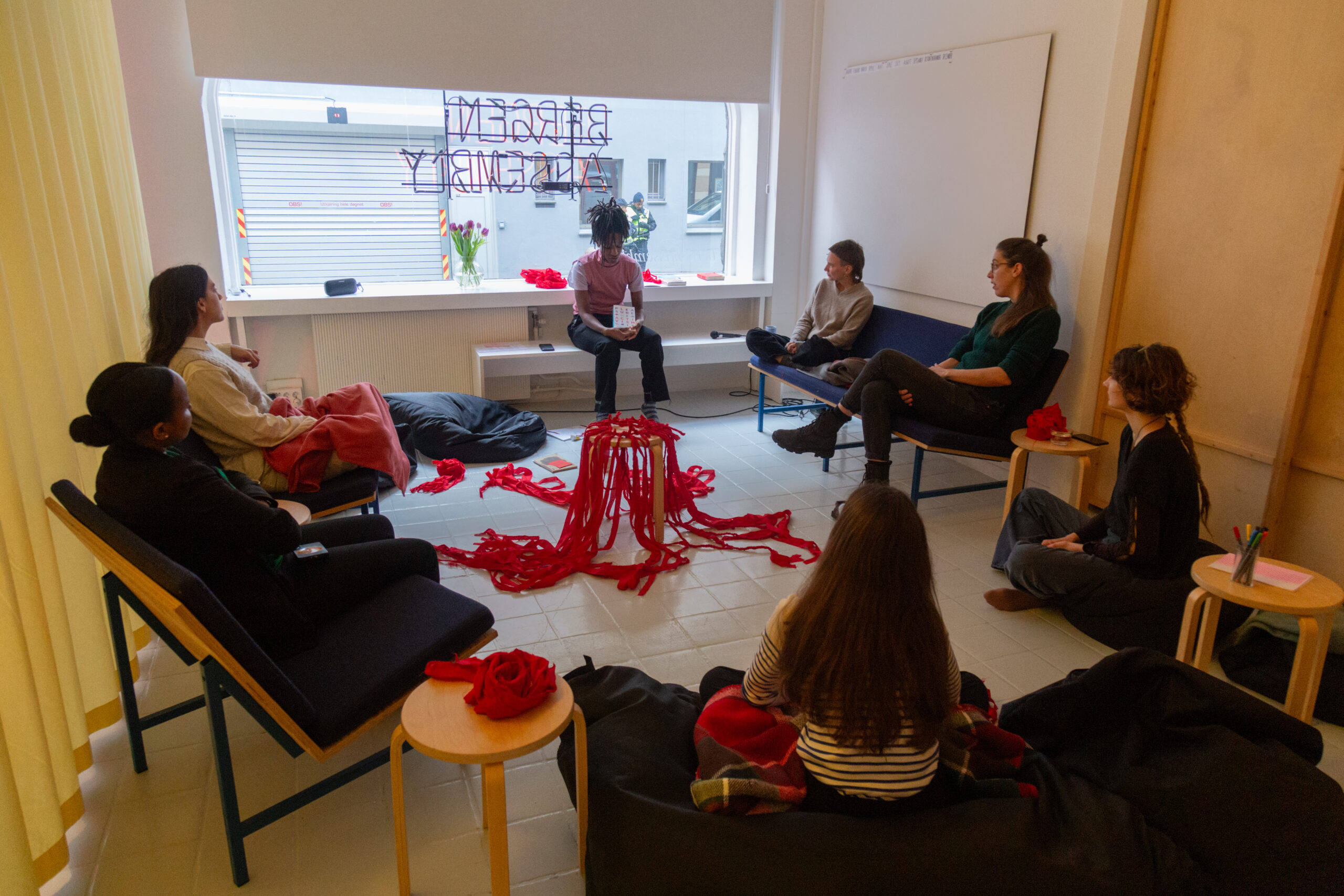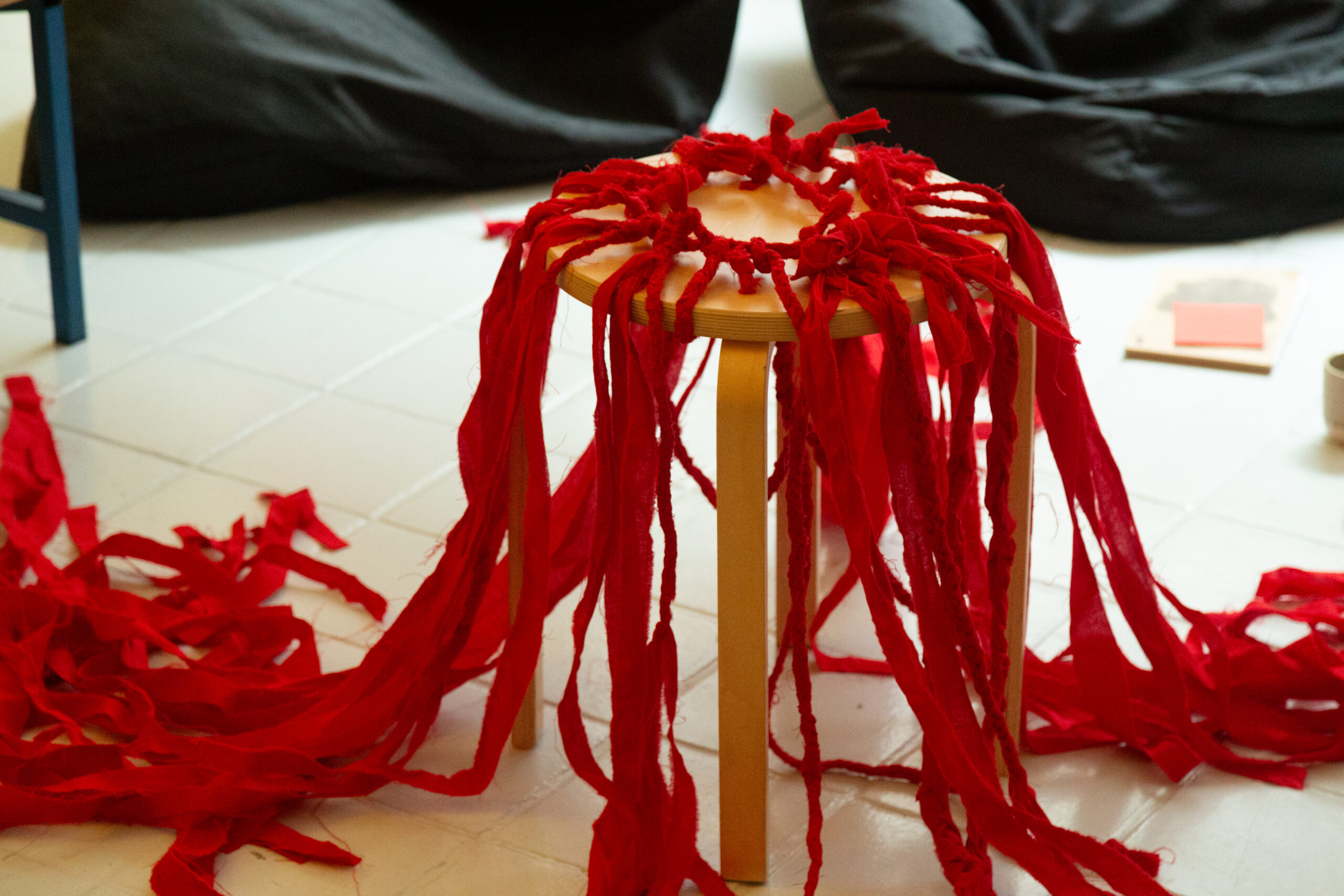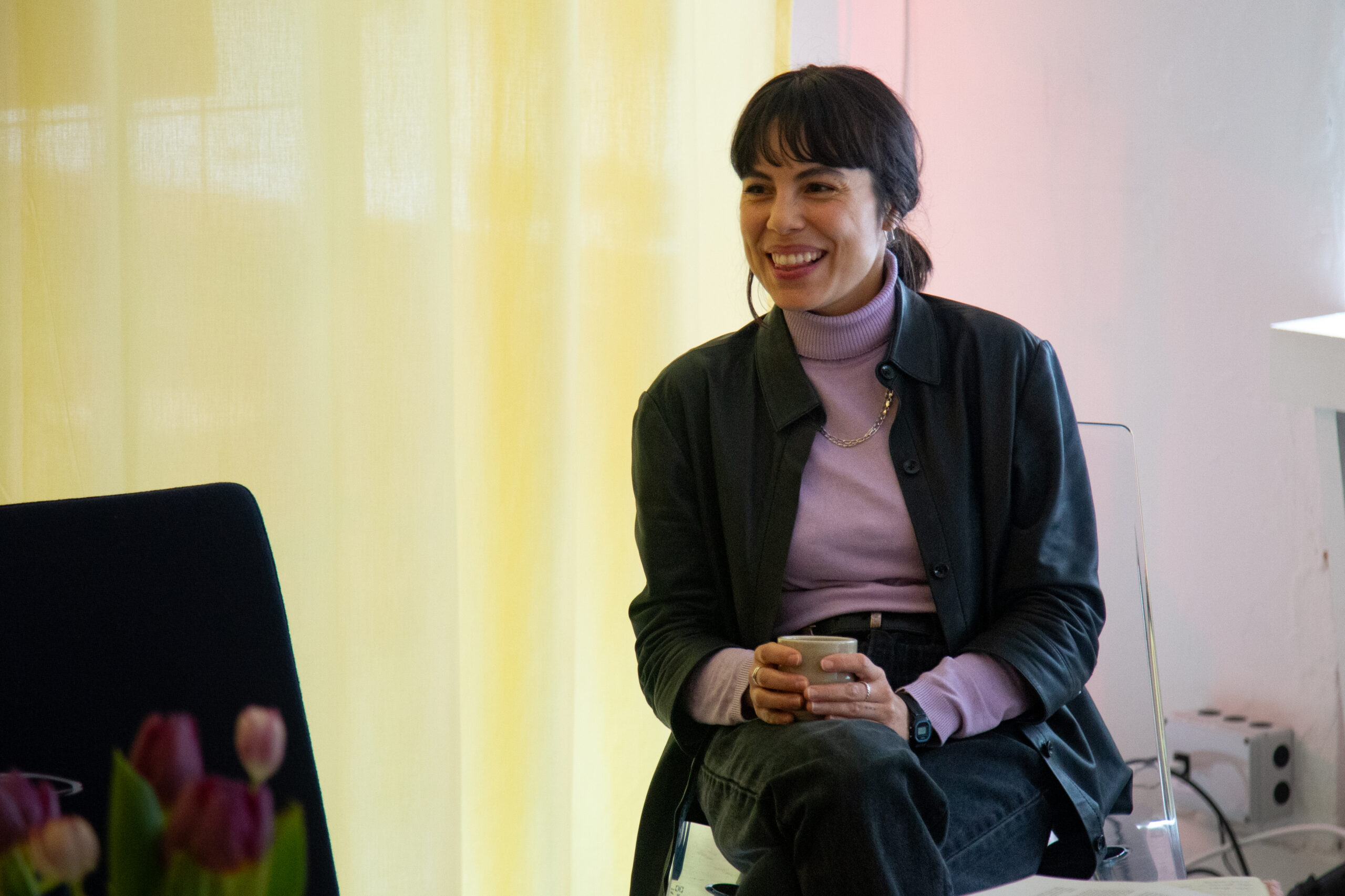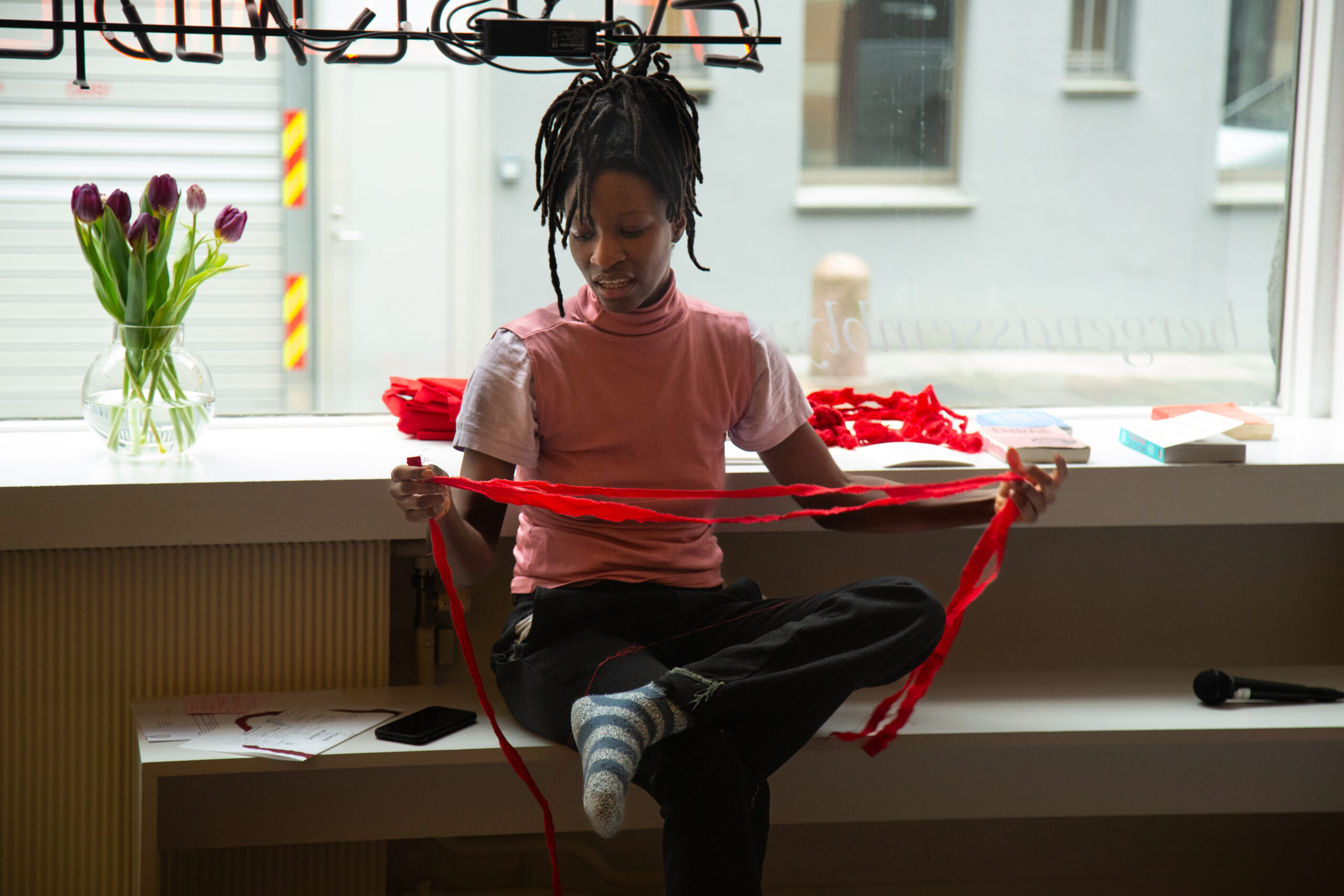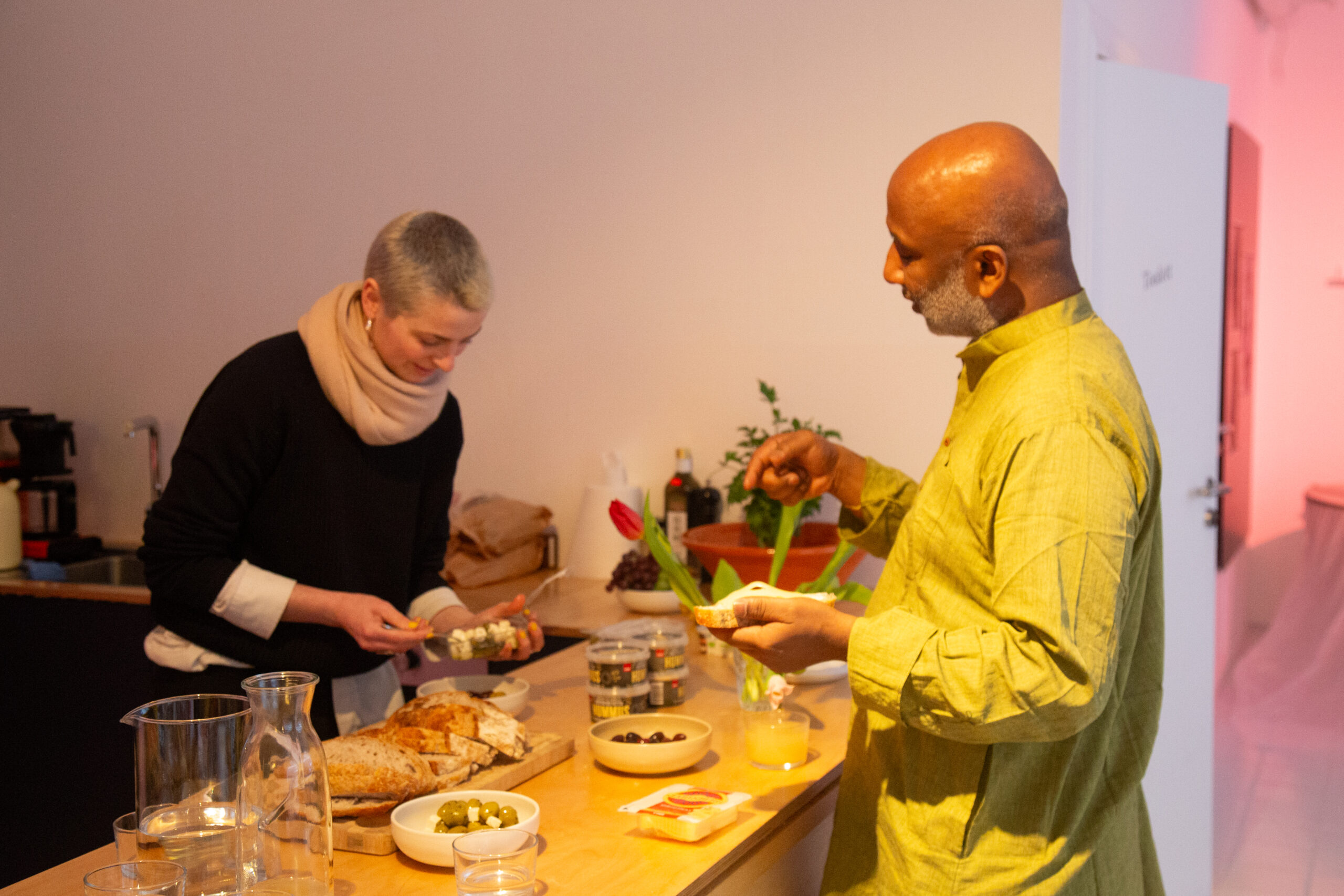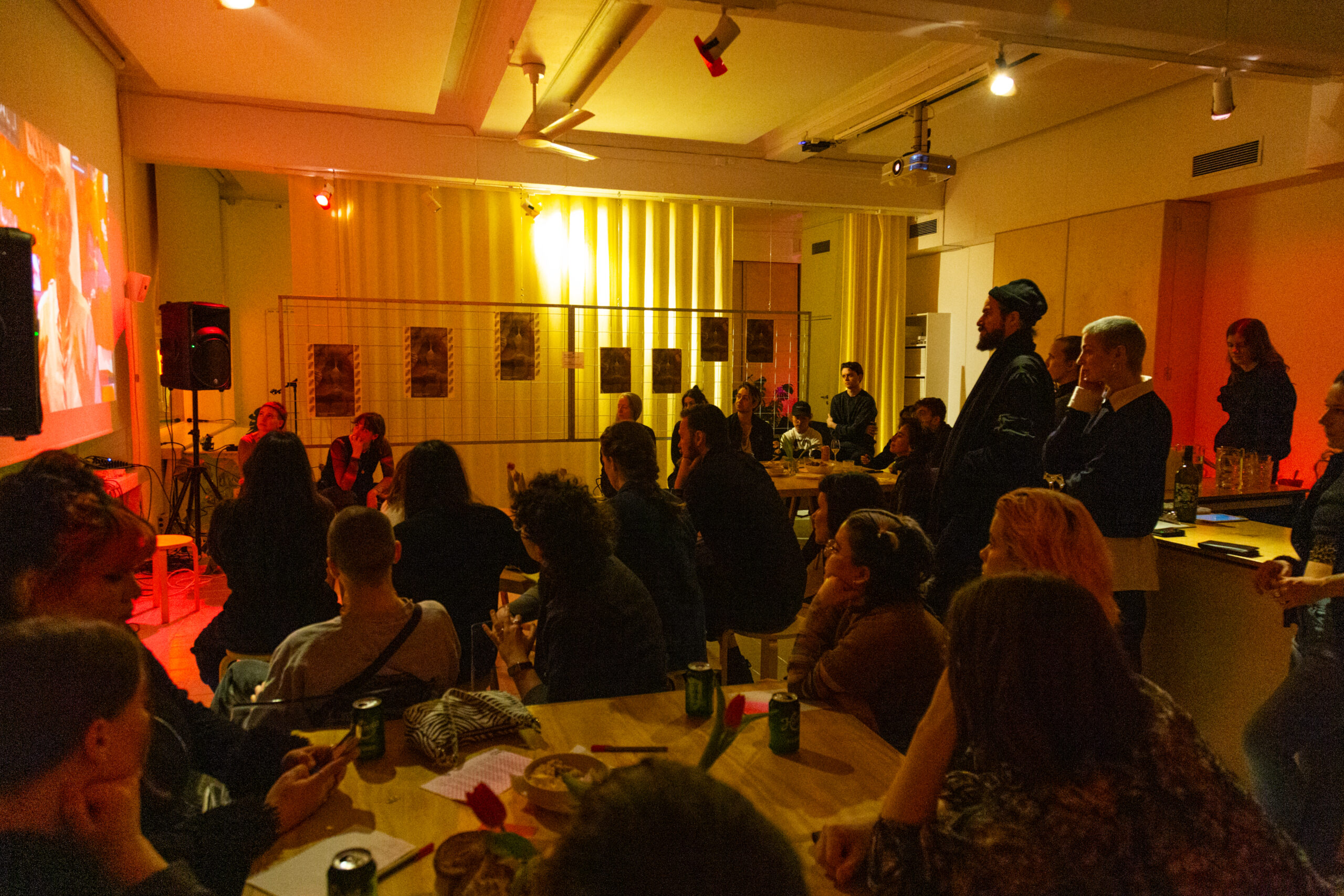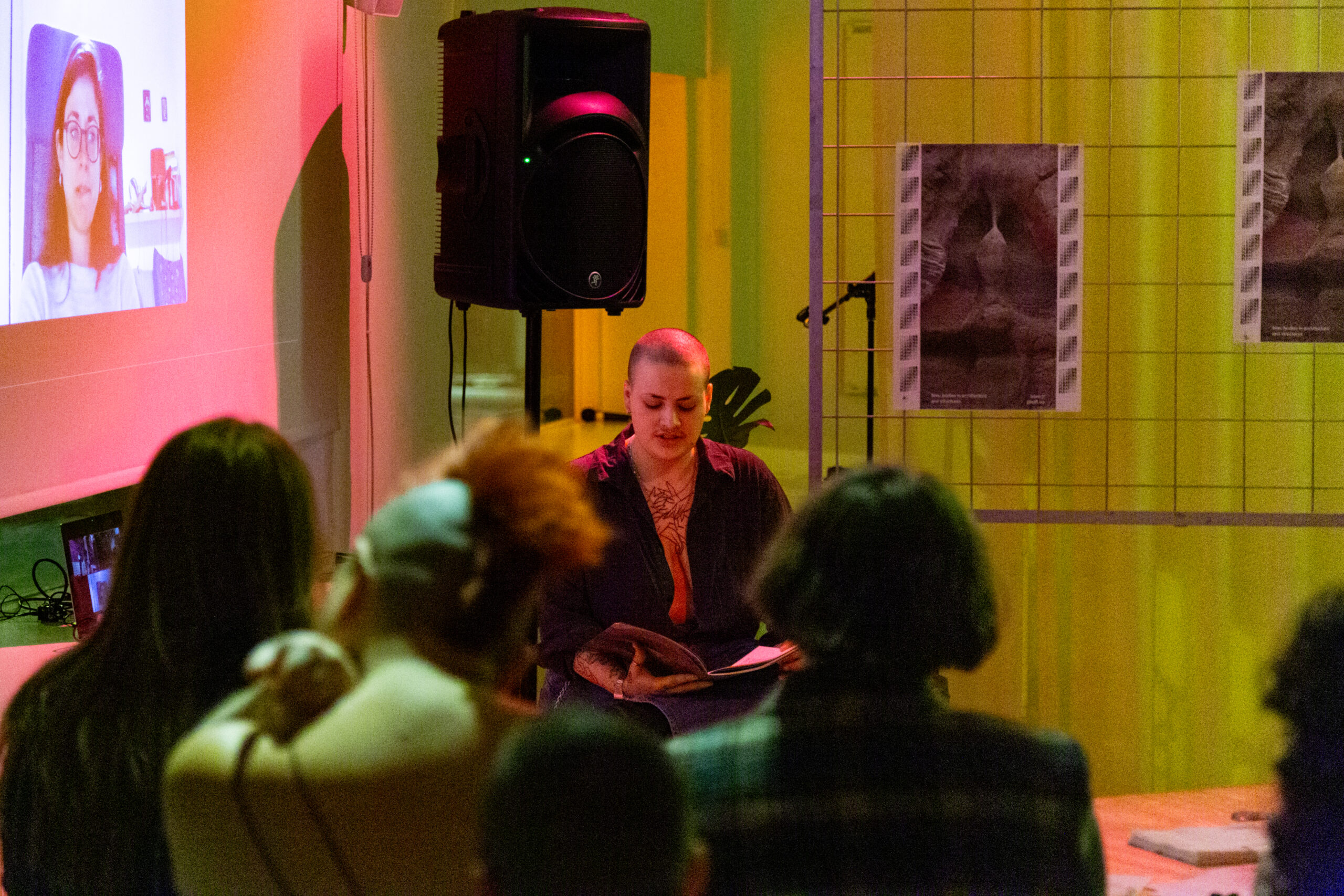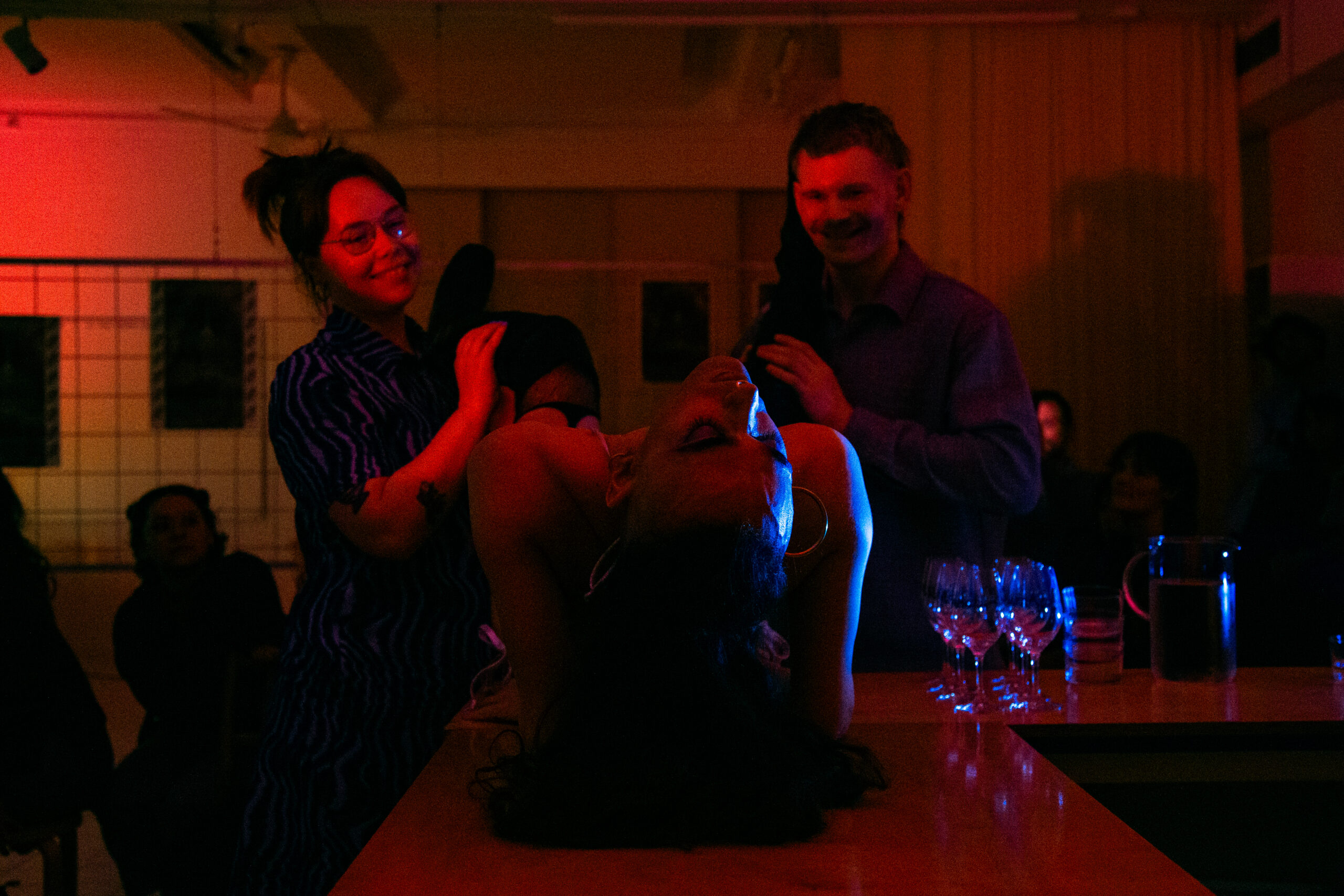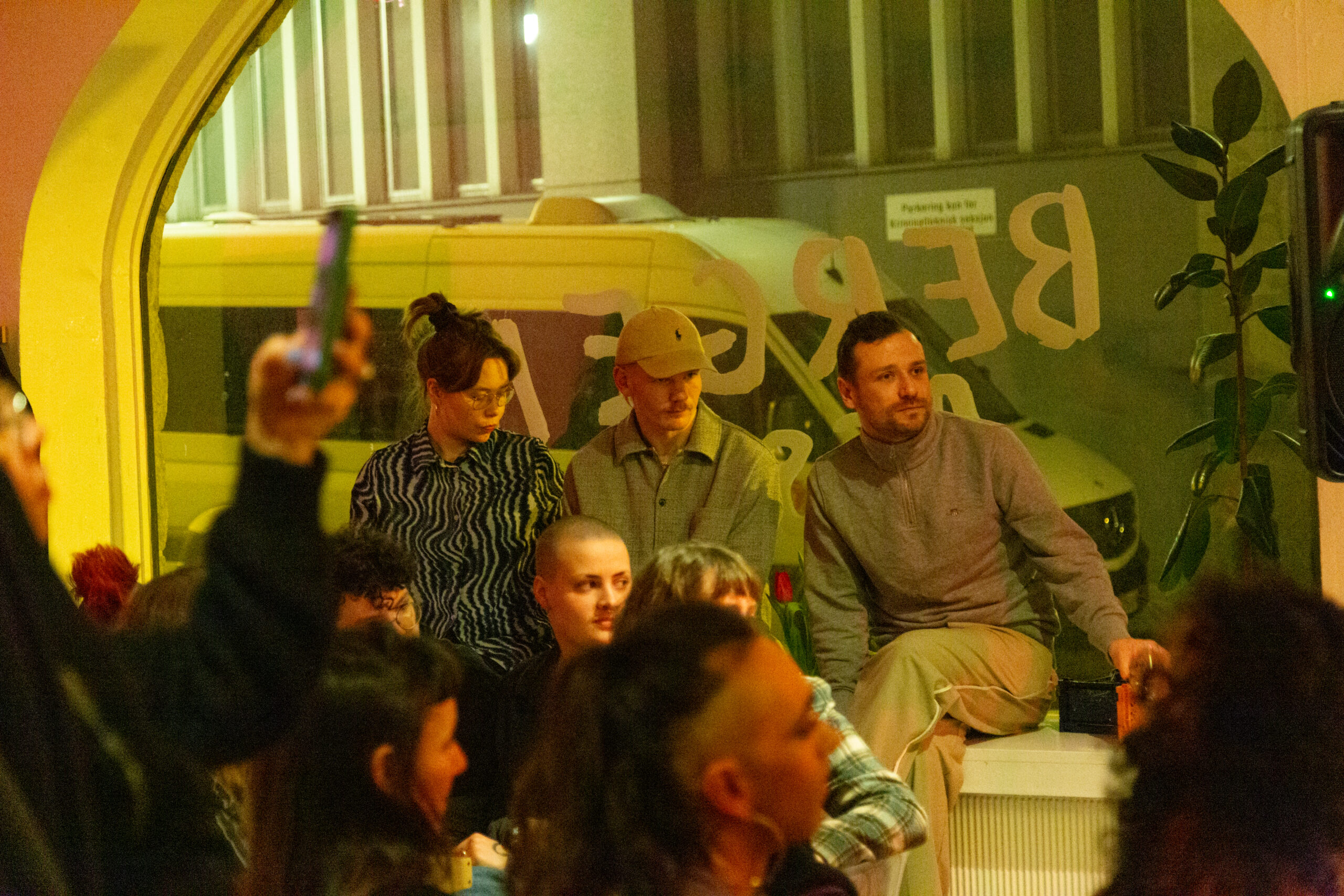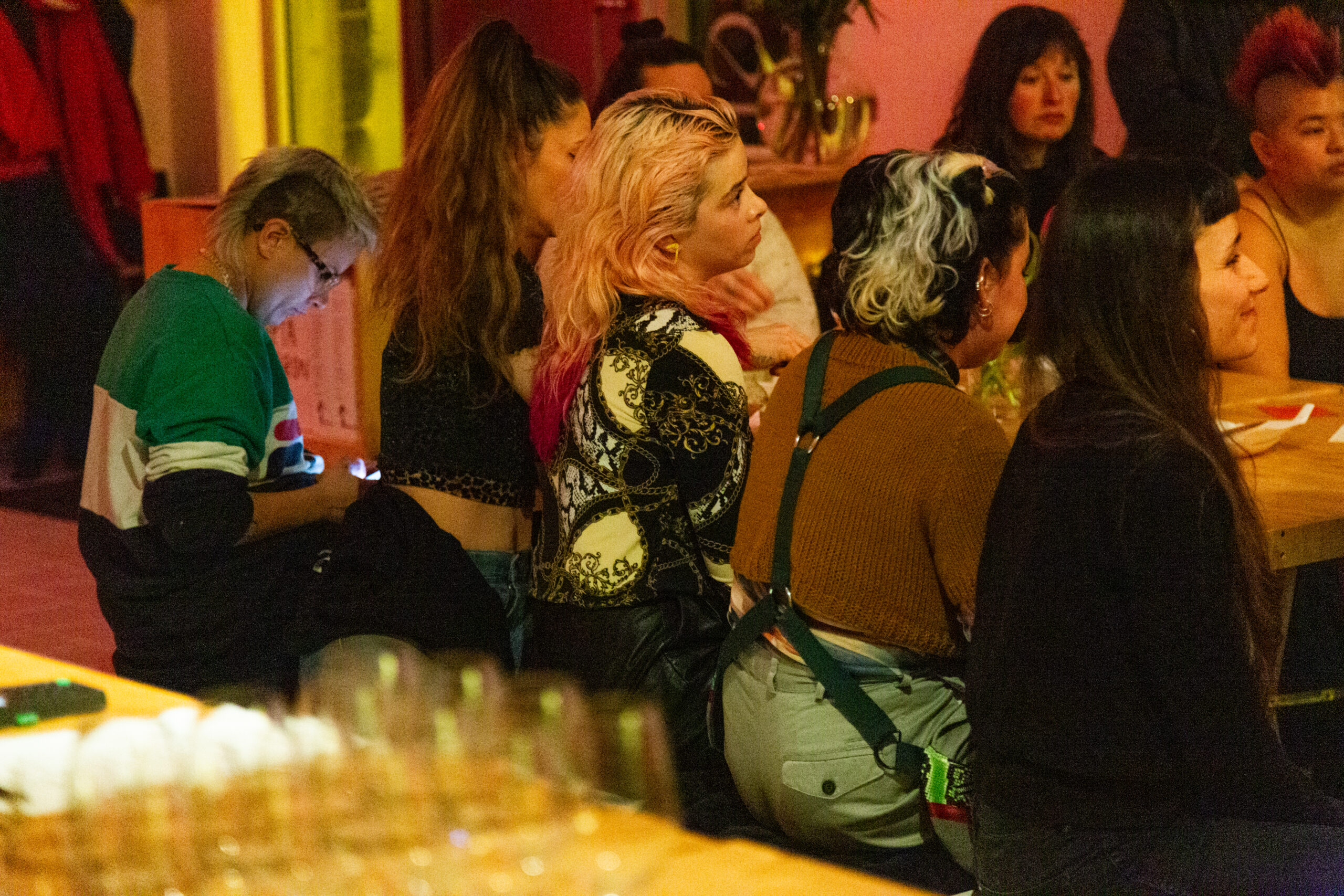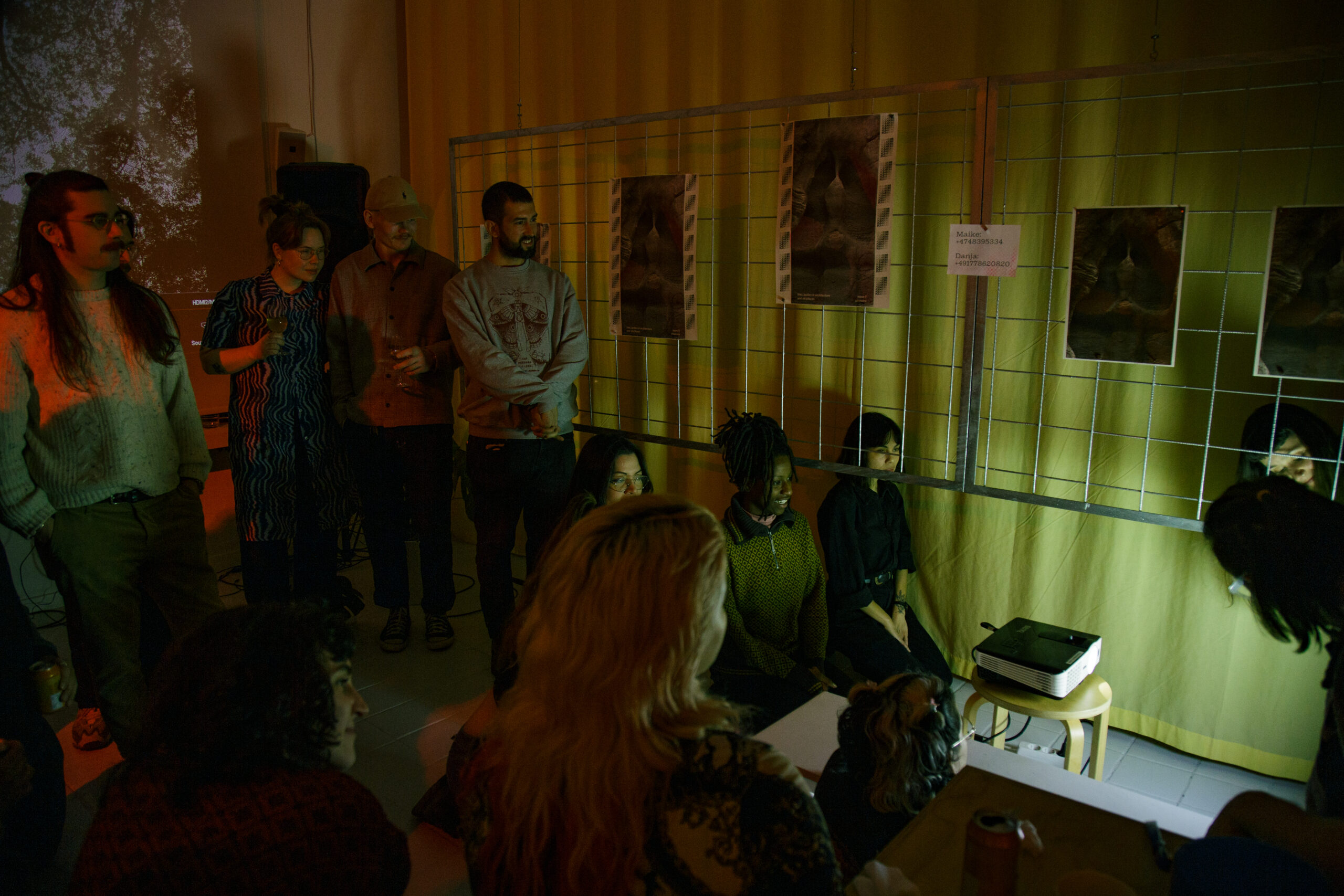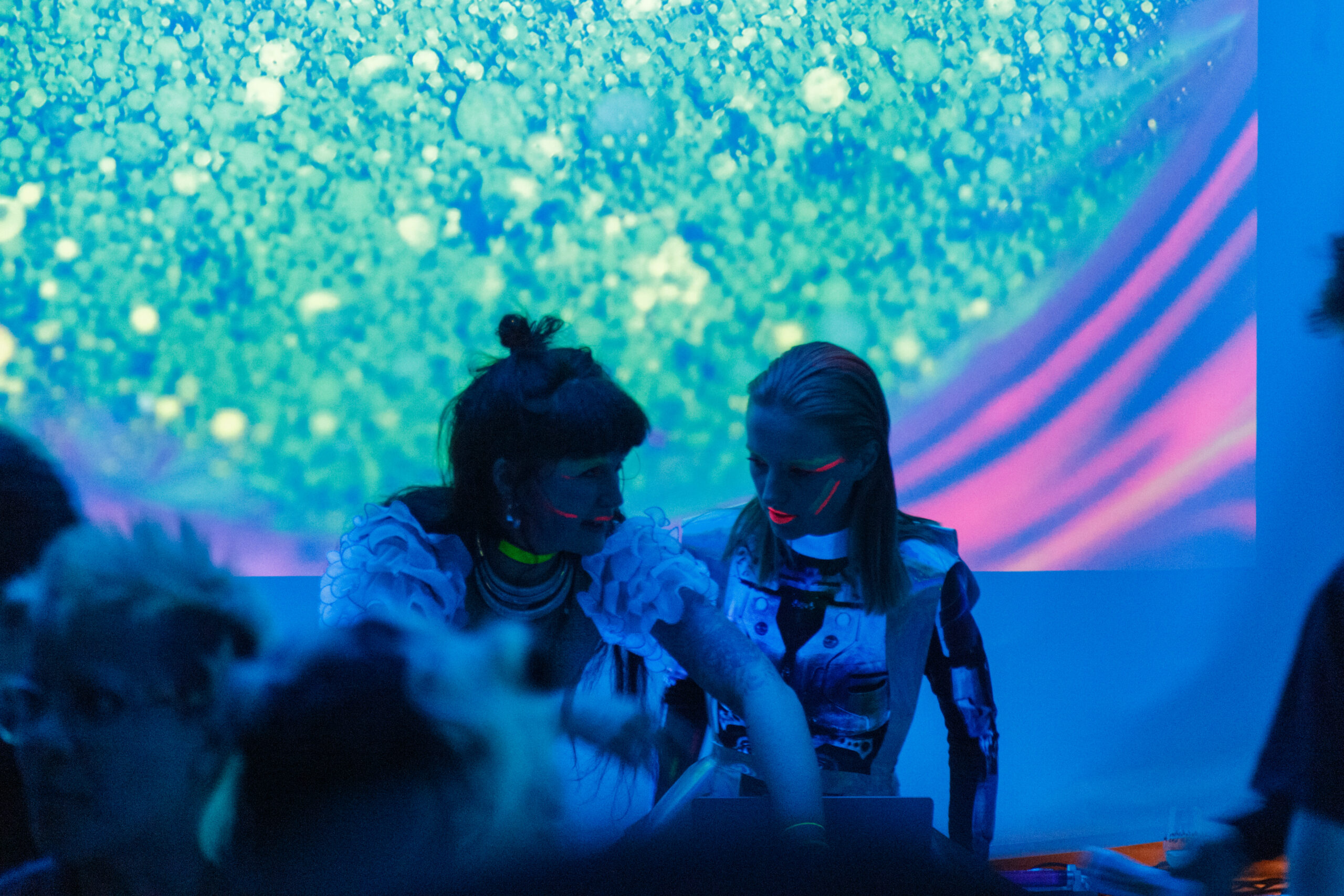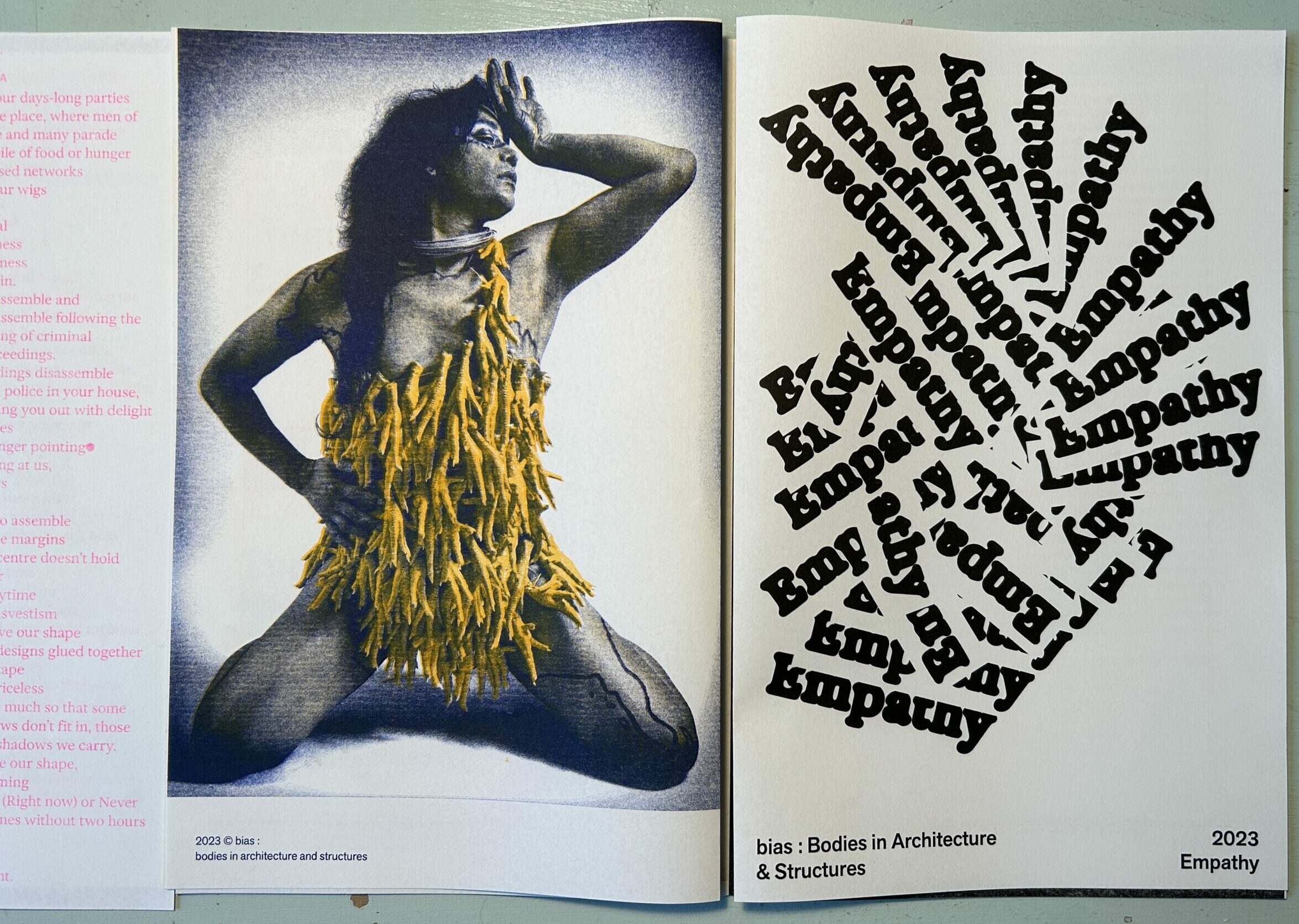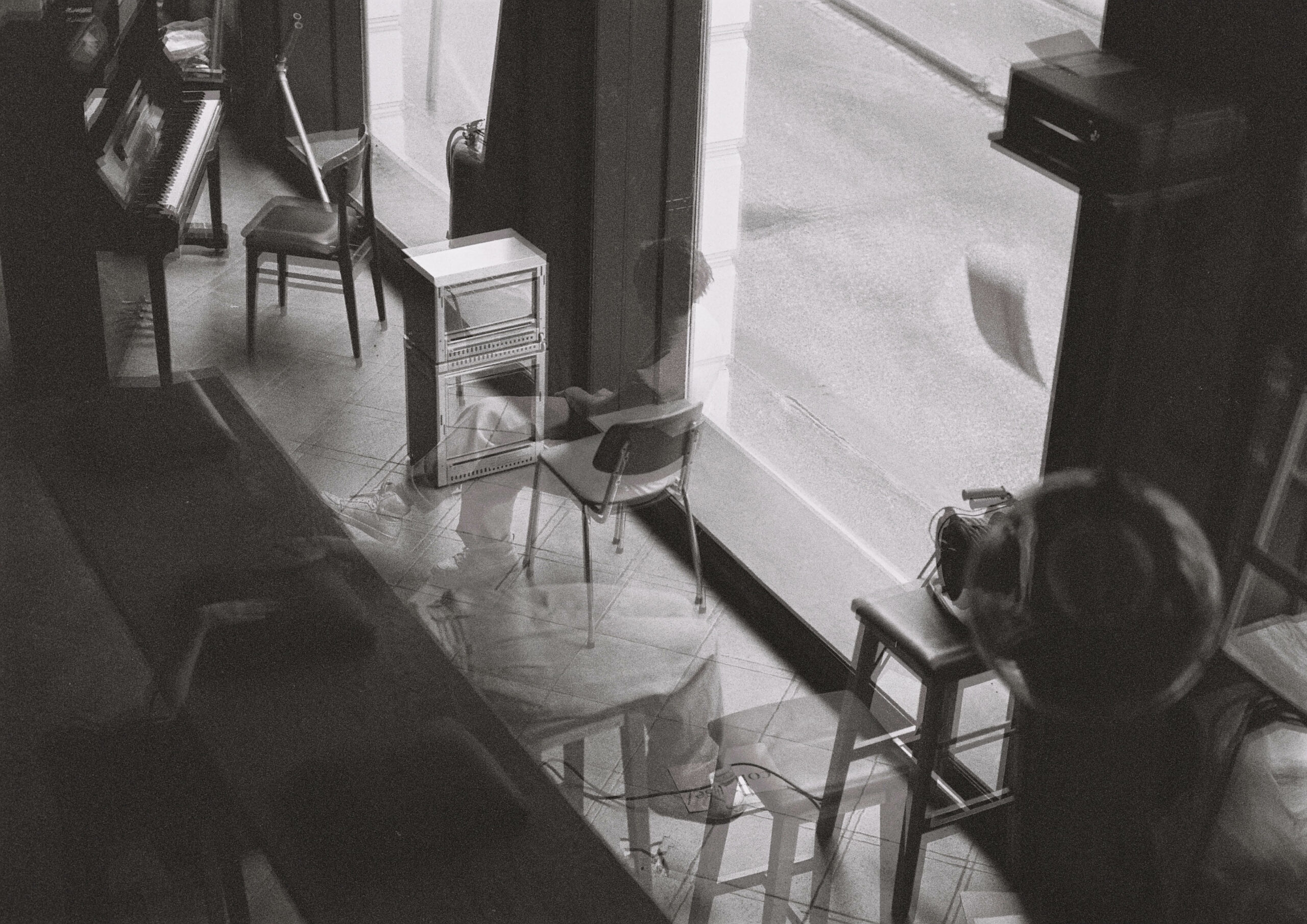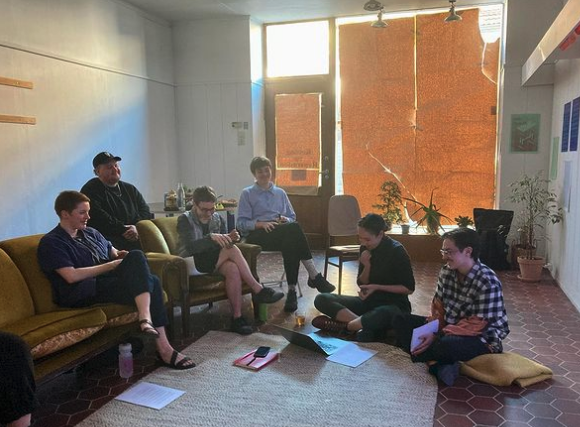PLEASURE critically explores the dissident, political, and activist potential of pleasure from the fields of architecture, performance, law, art, and activism.
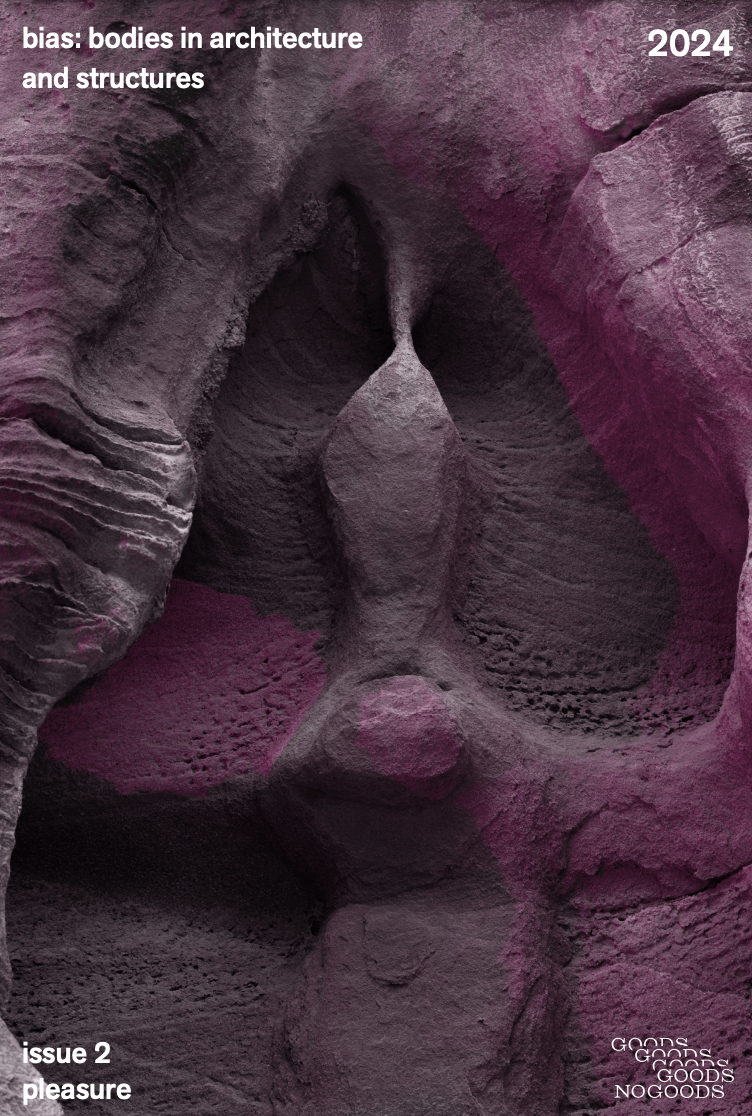
PLEASURE
Longing, overarching joy, laughter, the eros – pleasure.
Pleasure can be seen as frivolous and related to ideas of excess or gluttony.
But is this the case? Or can spaces of collective pleasure be seen as major pillars that support community building and sustain grassroots movements?
Spaces where pleasure is invited have historically been marginalized, rendered invisible, and pushed to the peripheries. Often, their design sheds light on the dominant social attitudes towards the experience of pleasure and sexuality, as well as constructions of gender or gender roles.
The expression and enactment of desire and pleasure is often contested, controlled, regulated, instrumentalized, stigmatized or else rendered invisible. This is dependent on the respective context, including the political and cultural framework and overriding social attitudes. Individually and collectively however, pleasure is also a force that reaches beyond political limitations, dismantling its tools of exclusion, pathologization and criminalization.
We aim to look at pleasure as a tool and method of liberation, to shine a light on its potential to juxtapose heteronormative and capitalist structures.
Can pleasure become a political source for a subject to re-frame its presence within the heteronormative political system? How is pleasure capable of proposing paradigmatic shifts in how we understand and approach the body, as a performative site of politics as well as a transformative territory?
How does space support or deny the potential for public displays of affection? How is pleasure embedded or restricted within urban planning and public space? What are the dynamics of inclusion, exclusion, desire, and even criminalization that are expressed?
Which architectures are capable of holding pleasure? What kinds of pleasure can architectures cultivate? How does pleasure shape and shift both: spaces and bodies? What kind of pleasure gets represented in the public?
And finally: Can pleasure be a tool to expose and expand the restrictive norms of heteronormativity?
bias (bodies in architecture and structures)
The program took shape of the magazine
bias (bodies in architecture and structures)
Issue 2: PLEASURE
Contributors
Aimée Theriod, Farah Fudeh, Francesca de Marinis, Kha Villanueva, Lynn Diniz, Marie Cole, MYCKET, Nina Erikson, Office Party, Bruna Kury, Christina Morales.
Editors
Maike Statz, Danja Burchard, Francesca Scapinello
Design
Thanee Andino and Vera Gomes
Proofread: Liam Foley
Participants:
Aimée Theriot (she/her, MX) is a musician interested in understanding the world through sound and vibration. Her music draws from free improvisation, ambient, ASMR, and soundscape recordings, with a heavy dose of experimentation using live electronics, e-cello, guitar, and voice. She co-founded and facilitates The Social Music Club: open improvisation and sound experimentation sessions for musicians and non-musicians alike. Her work has been presented at festivals and galleries internationally, and her music has been featured in labels such as Sofa Music, Editions Verde, Unheard Records, and Relative Pitch Records, amongst others. She lives in Amsterdam.
Bruna Kury (she/her) was born in 1987 and lives and works in Barcelona. She is a Brazilian, anarcatransfeminist, performer, visual, and sound artist, currently developing works in different contexts, whether in the institutional art market or in edge productions. She is focused on creations crossed by issues of gender, class, and race (against the prevailing compulsory heteronormative patriarchal cistern and structural oppressions/class war). She has performed with Coletiva Vomito, Coletivo Coyote, La Plataformance, MEXA, and Coletivo T. She is currently investigating sonorities in the postporno and the creation of objects that are ramifications of her work with performance. She participated in the Capacete artistic residency in Rio de Janeiro, Comunitária in Argentina, and Festival Abnormal in Mexico. She recently organized the postpornôpyrata residency in Fortaleza (CE) and performed at the festival Libres y Soberanas aka Performacula in Quito, Ecuador.
Cristina Morales (she/her) is the author of the novels Lectura fácil (Easy Reading, 2018), Terroristas modernos (2017), Últimas tardes con Teresa de Jesús (2015), and Los combatientes (2013), as well as the collection of short stories La merienda de las niñas (2008). Easy Reading was awarded the Premio Nacional de Narrativa 2019, the Premio Herralde de Novela 2018, and the Prize for Contemporary Literature in Translation 2022 for the German translation by Friederike von Criegern. In 2012, she received the Premio INJUVE de Narrativa from the Spanish Government. She was recipient of a scholarship at the Royal Spanish Academy in Rome in 2021 and, in the same year, was voted among the 25 most important authors under 35 by Granta magazine. Cristina Morales studied Law and Political Science with emphasis on International Relations. She is a dancer and choreographer with the company Iniciativa Sexual Femenina, producer for the punk band At-Asko, and archivist and difusora de mugrelindas of the collective BachiniBachini. Furthermore, she works as a dramaturg for several theaters and companies in Spain.
Farah Foudeh (she/her, b. 1991) began working within the south of Jordan after returning from Washington DC with a degree in International Relations. Following a few years working in tourism development, she pursued a Masters degree in Photography at ELISAVA (2017) , Barcelona. She began her photographic career by exploring the power structures and dynamics that take shape within the desert landscapes. Foudeh primarily works around the deserts of Jordan. She has been photographically connected to the south for over a decade, working mainly between Wadi Rum and Petra. Foudeh enjoys photographing places that are overly photographed, searching for meaning within the visual narrative of these physical spaces. With her camera, she explores the internal and external experience of the desert. Looking at the role of the camera, tourism, and political structures in shaping the realities of the communities connected to the desert. She later dives deeper into understanding the masculine skeleton of the southern landscapes.Today, she explores the desert as a feminine space. Reclaiming both her femininity and that of the desert. She mainly works alone, coloring the desert with shades both known and otherworldly, connecting us to the intimate and unchartered within the desert, and within ourselves.
Francesca De Marinis (she/her) is a Judge for criminal law based in Italy. Specializing in the execution and enforcement of juridical sentences and verdicts, she works daily with prisoners. De Marinis holds a PhD in Human Rights, focusing on labor exploitation and immigration. She worked as a volunteer in the association Antigone, which is focused on the assurances of the criminal law system and rights of prisoners. Together with other volunteers of Antigone (lawyers and psychologists), she set up a free legal help desk in a female prison in South Italy and participated for three years. During this experience, she met dozens of female prisoners and investigated the contradiction of the criminal law system from a gender perspective with them and through their lived experiences.
Kha Villanueva (she/her) is a non-binary, Mediterranean transvestite femininity, performative artist, stage creator, and group psychologist. She graduated in Psychology from the UAB and obtained her postgraduate in Group Psychotherapy and Psychodrama from the UB. She is the co-founder of the collective PORNOTOPÍA. She centers her work on the exploration of the collective psyche through performance and the scenic device as a tool for personal and social transformation, focusing on dissident corporalities. Her professional practice focuses on the development of stage methodologies from a transfeminist and anti-racist perspective, putting her cross-dressing and identity performance at the center of her work.
Lyn Diniz is a TRANS-migrant artist, who graduated in Performing Arts (Brazil 2006-2009). Lyn worked at the c.e.m-centro en movimento (2009–2014, Lisbon – PT), developing artistic research on the body–city relationship. Lyn completed a Masters in Performing Practices and Visual Culture (Museo Nacional Centro de Artes Reina Sofia and ARTE-A – Madrid, 2014) and graduated from studies in Transfeminism at the Federal University of Sul da Bahia. In 2020, Lyn was part of the programming of the LGTBQIA+ week of the Reina Sofía Museum (Madrid/ES), with the SEXYLIADES project, which was focused on dissident sex-gender migrant artists.
Marit Östberg (she/her) is a filmmaker, writer, and intimacy coordinator. As a filmmaker, Östberg has explored ways of portraying queer communities, sex, and sexualities. She finds the collective processes of film productions fascinating — how creating moving images of communities also creates queer contexts and meanings through the film work itself. As a natural extension of her filmmaking, Östberg has become an intimacy coordinator, working with safety in relation to intimate scenes for TV series and film productions.
Office Party is an international research and design collective specializing in the production of temporary events, installations, and exhibitions. The office critically examines the role of parties and similar ephemeral spaces as the origin of complex social and material networks with urban, political, and environmental effects. Office Party further investigates the ways that parties provide insight into the development of architecture as a temporary and responsive mode of space-making through written and editorial work, including the production of its annual publication, Party Planner.
Marie Cole (she/her) is a Norwegian visual artist of Guinean descent, based in Oslo, where she works with mediums such as video, painting, performance, and textile. Her artistic practice is based on exploring and examining her identity and the narrative society puts on her body. Marie Cole has a Master’s in Visual Communication from the University for the Creative Arts, Canterbury (UK). She recently exhibited at Studio 17 in Stavanger and at the Oslo Negativ festival with the artistic/curatorial collective Tenthaus, and made her debut at the Autumn Exhibition at Kunstnernes hus, Oslo, in the current edition. As part of the Diaspora Collective, she has been involved in holding workshops for people who identify as BIPOCQ.
MYCKET was founded in 2012 by the artists, designers, and architects Mariana Alves Silva, Dr. Katarina Bonnevier, and Thérèse Kristiansson. Based on equity and social sustainability, they practice at all scales (art, furniture, performance, architecture, public space, spatial, and urban planning) and are informed by the more-than-human, the carnivalesque, and queerness.
Nina Eriksson (she/her, SWE) is a Bergen based artist with a focus on text, textile, and texture. She is currently in the first year of her MFA at Kunstakademiet i Bergen. Her work centers on experiences of queerness, on emotion and sensation, and on language. An interest in both what queer sculpture and queer writing (and queer being, for that matter) can be and mean informs her practice continuously, often concerning the tension between societally recognizable shared queer signifiers and very personal aspects of LGBTQ+ identity. Recently, she has presented her work at KODE, Bergen, and Galleri Taxi, Bergen. Her writing has appeared in Queer Futures Zine (2022, UK) and HÄN Edition 1 (UK, 2022), among others.
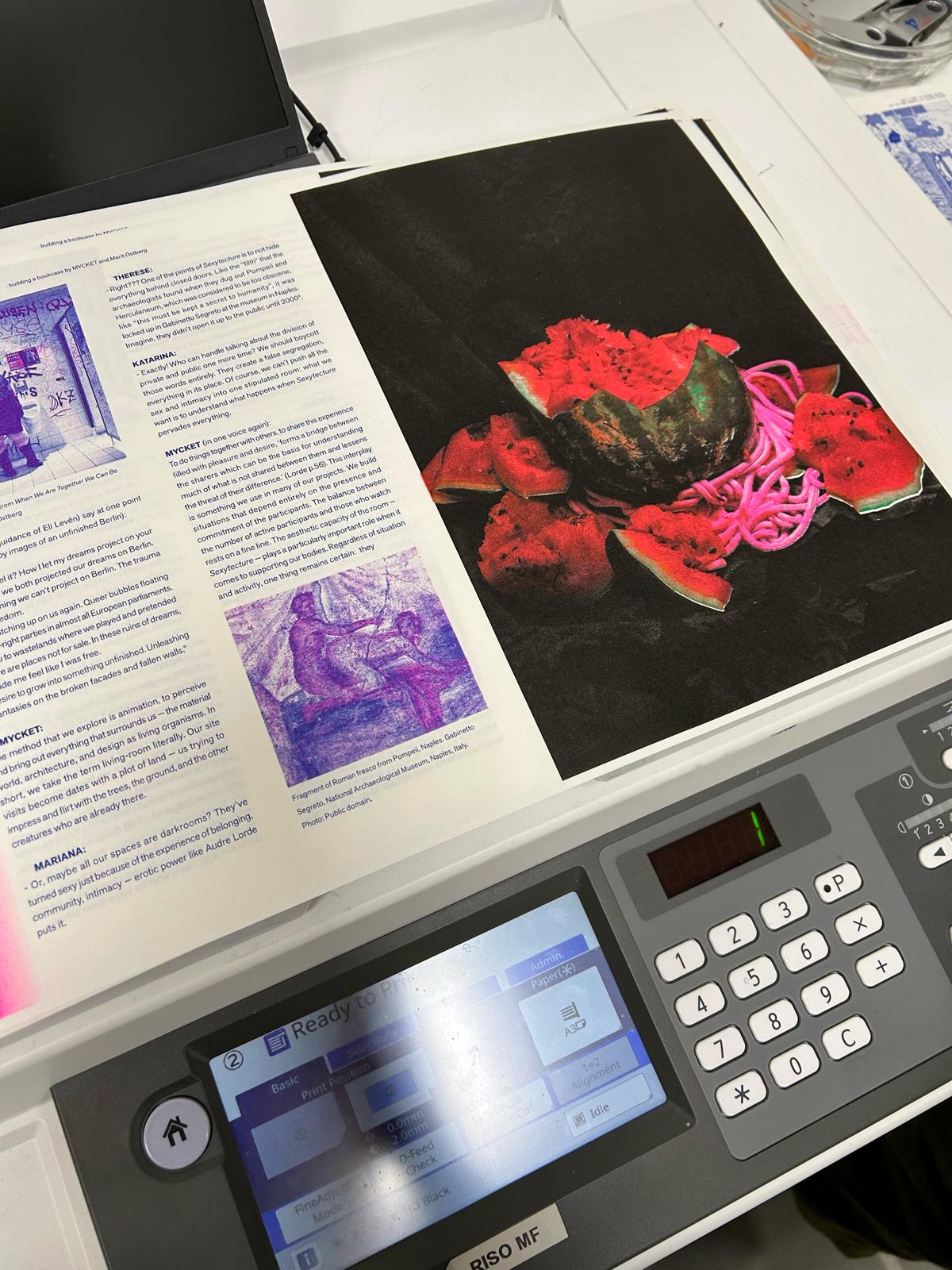
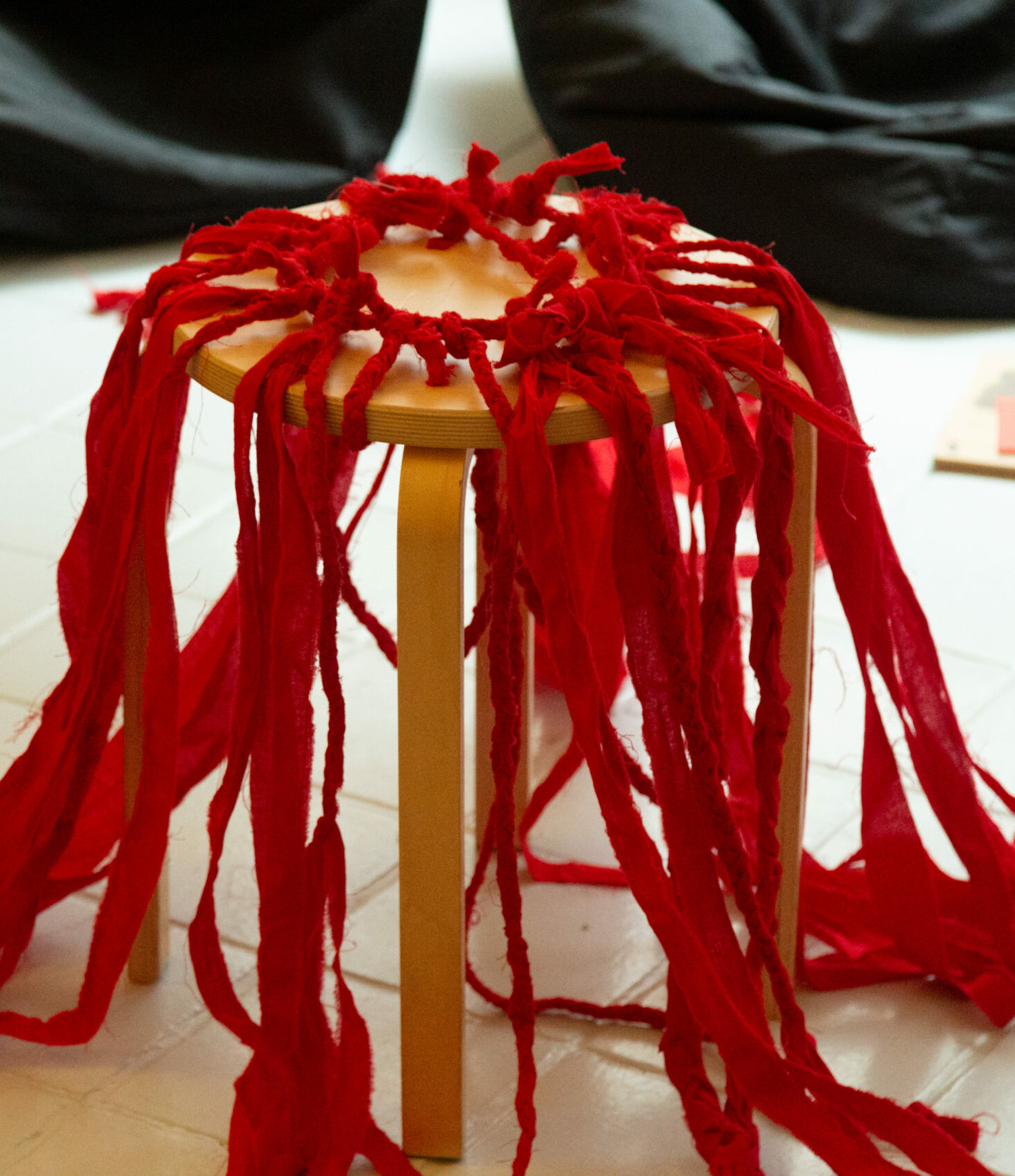
PLEASURE – Magazine Launch
Saturday 24.02.2024 at Bergen Assembly
Together we aim to look at PLEASURE as a tool and method of liberation, a way to challenge restrictive regulations and social norms.
With Aimée Theriod, Francesca de Marinis, Kha Villanueva, Lynn Diniz, Marie Cole, MYCKET, Nina Erikson, Walk of Shame.
Participants:
Aimée Theriot (she/her, MX) is a musician interested in understanding the world through sound and vibration. Her music draws from free improvisation, ambient, ASMR, and soundscape recordings, with a heavy dose of experimentation using live electronics, e-cello, guitar, and voice. She co-founded and facilitates The Social Music Club: open improvisation and sound experimentation sessions for musicians and non-musicians alike. Her work has been presented at festivals and galleries internationally, and her music has been featured in labels such as Sofa Music, Editions Verde, Unheard Records, and Relative Pitch Records, amongst others. She lives in Amsterdam.
Francesca De Marinis (she/her) is a Judge for criminal law based in Italy. Specializing in the execution and enforcement of juridical sentences and verdicts, she works daily with prisoners. De Marinis holds a PhD in Human Rights, focusing on labor exploitation and immigration. She worked as a volunteer in the association Antigone, which is focused on the assurances of the criminal law system and rights of prisoners. Together with other volunteers of Antigone (lawyers and psychologists), she set up a free legal help desk in a female prison in South Italy and participated for three years. During this experience, she met dozens of female prisoners and investigated the contradiction of the criminal law system from a gender perspective with them and through their lived experiences.
Kha Villanueva (she/her) is a non-binary, Mediterranean transvestite femininity, performative artist, stage creator, and group psychologist. She graduated in Psychology from the UAB and obtained her postgraduate in Group Psychotherapy and Psychodrama from the UB. She is the co-founder of the collective PORNOTOPÍA. She centers her work on the exploration of the collective psyche through performance and the scenic device as a tool for personal and social transformation, focusing on dissident corporalities. Her professional practice focuses on the development of stage methodologies from a transfeminist and anti-racist perspective, putting her cross-dressing and identity performance at the center of her work.
Lyn Diniz is a TRANS-migrant artist, who graduated in Performing Arts (Brazil 2006-2009). Lyn worked at the c.e.m-centro en movimento (2009–2014, Lisbon – PT), developing artistic research on the body–city relationship. Lyn completed a Masters in Performing Practices and Visual Culture (Museo Nacional Centro de Artes Reina Sofia and ARTE-A – Madrid, 2014) and graduated from studies in Transfeminism at the Federal University of Sul da Bahia. In 2020, Lyn was part of the programming of the LGTBQIA+ week of the Reina Sofía Museum (Madrid/ES), with the SEXYLIADES project, which was focused on dissident sex-gender migrant artists.
Marie Cole (she/her) is a Norwegian visual artist of Guinean descent, based in Oslo, where she works with mediums such as video, painting, performance, and textile. Her artistic practice is based on exploring and examining her identity and the narrative society puts on her body. Marie Cole has a Master’s in Visual Communication from the University for the Creative Arts, Canterbury (UK). She recently exhibited at Studio 17 in Stavanger and at the Oslo Negativ festival with the artistic/curatorial collective Tenthaus, and made her debut at the Autumn Exhibition at Kunstnernes hus, Oslo, in the current edition. As part of the Diaspora Collective, she has been involved in holding workshops for people who identify as BIPOCQ.
MYCKET was founded in 2012 by the artists, designers, and architects Mariana Alves Silva, Dr. Katarina Bonnevier, and Thérèse Kristiansson. Based on equity and social sustainability, they practice at all scales (art, furniture, performance, architecture, public space, spatial, and urban planning) and are informed by the more-than-human, the carnivalesque, and queerness.
Nina Eriksson (she/her, SWE) is a Bergen based artist with a focus on text, textile, and texture. She is currently in the first year of her MFA at Kunstakademiet i Bergen. Her work centers on experiences of queerness, on emotion and sensation, and on language. An interest in both what queer sculpture and queer writing (and queer being, for that matter) can be and mean informs her practice continuously, often concerning the tension between societally recognizable shared queer signifiers and very personal aspects of LGBTQ+ identity. Recently, she has presented her work at KODE, Bergen, and Galleri Taxi, Bergen. Her writing has appeared in Queer Futures Zine (2022, UK) and HÄN Edition 1 (UK, 2022), among others.
11:00 – 14:00
to your ears’ content: explorations on erotic listening
Workshop with Aimée Theriot
In this workshop, we will explore the practice of listening as a co-creative and world-building strategy. Erotic listening is a concept Aimée has been exploring in her practice and is deeply inspired by the writings of Audre Lorde on the uses of the erotic as power. During this session, we will do a collective reading of Aimée’s sonic meditation “to your ears’ content” which puts into practice this concept. Participants will work with their voices as a sounding body and can bring other sounding objects as well. No prior experience in music or singing is needed. This workshop is open for anyone with an interest in the emancipatory and community-building potential of listening and sounding practices.
15:00 – 17:00
“is pleasure a privilege?”
Collective Braiding Workshop with Marie Cole
In an overstimulated world and society, join me in a workshop that delves into the topic of pleasure and rituals. Unpack the question, “Is pleasure a privilege?” and explore how rituals can become sanctuaries for pleasure.
“Collective braiding” emerges as more than a creative activity; it’s a ritualistic engagement designed to foster care, mindfulness and communication. Rooted in the intention for collective well-being, this series of shared moments uses rhythmic communication as a means to record movement, connections, and time. The technique involves interlacing three or more strips of textiles, each representing a unique thread of experience, creating a collective artwork that symbolises the interconnectedness of participants. Beyond the aesthetics, the overall objective of “Collective Braiding” goes deeper. It seeks to explore and imagine a space for those denied access to pleasure due to systemic oppression. The act of braiding becomes a metaphor for weaving a supportive space where the denied and oppressed can find rest, creativity, and connection. Through a simple yet impactful act of braiding, participants engage in a shared narrative that speaks to the possibility of creating welcoming spaces for pleasure and well-being. During the workshop we will immerse ourselves in collective braiding, writing & drawing to reflect and share on our own practices of pleasure and care.
19:00
PLEASURE: A Discursive Collage
with Francesca De Marinis (IT), MYCKET (SE), and readings by Nina Eriksson
20:30
Sound Performance
by Aimée Theriot
21:30
That’s Not g0g0te0 – Performance
by Lyn Dyniz and Kha Villanueva, PORNOTOPIAcollective
The Gogo’s landscape presents itself with border areas made of bodies that tear apart the centrality of the penis–vagina pairing. It shatters with a narrative line structured by a dramatic ejaculatory rhythm, giving rise to other rhizomatic temporalities. The performative masturbatory excitement of the white–bourgeois–passive spectator is dismantled. We don’t get fired up to reach a final climax. We banish the pleasure of the hegemonic-macho eye. We get entangled in our folds and holes, we slip on our own fluids. We enjoy and rave in circular, cyclical, labyrinthine movements. Orgasmic and unruly. Stimulated by the waves of a self-proclaimed soft-porn, giving ourselves over to an explicit and degenitalized sexual practice.
22:00
DJ + Closing Party with Walk of Shame
Radikalt Utopisk Nettverk, I’ll buy you a husband to match your earrings plays post-punk, exotica, new wave and other gems.
